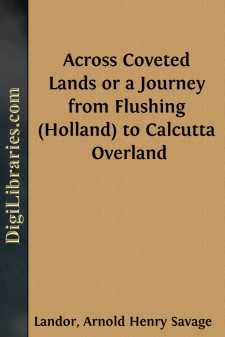Travel
- Africa 29
- Alaska 3
- Asia 46
- Australia & Oceania 26
- Canada 31
- Caribbean & West Indies 5
- Central America 1
- Europe 151
- General 39
- Maps & Road Atlases 1
- Mexico 10
- Middle East 18
- Polar Regions 7
- Reference 11
- Restaurants 1
- Russia 6
- South America 16
- United States 71
Travel Books
Sort by:
The story of Rome is the most splendid romance in all history. A few shepherds tend their flocks among volcanic hills, listening by day and night to the awful warnings of the subterranean voice,—born in danger, reared in peril, living their lives under perpetual menace of destruction, from generation to generation. Then, at last, the deep voice swells to thunder, roaring up from the earth's...
more...
CHAPTER I The start—The terrors of the Russian Custom-house—An amusing incident at the Russian frontier—Politeness of Russian officials—Warsaw: its sights; its lovely women—The talented Pole—People who know how to travel by train—A ludicrous scene. "First single to Baku," I requested when my turn came at the window of the ticket office at Victoria Station. "Baku?—where is...
more...
by:
Harry De Windt
CHAPTER I THROUGH EUROPE. THE TRANS-SIBERIAN RAILWAY. The success of my recent land expedition from Paris to New York is largely due to the fact that I had previously essayed the feat in 1896 and failed, for the experience gained on that journey was well worth the price I paid for it. On that occasion I attempted the voyage in an opposite direction—viz., from America to France, but only half the...
more...
by:
Gerald Prance
CHAPTER I Montenegro's geographical position—Character of the people—Their honesty, patriotism, and love of arms—Likeness to the Homeric Greeks—The women—Montenegrin manners, vices, heroism, lack of privacy, police—Goodness of the Prince—The national costume—Religion—Hatred of Austria—Russia's friendship. Roughly Montenegro is diamond-shaped, with its points towards north...
more...
INTRODUCTION. The person who communicated the following intelligence respecting Timbuctoo and Housa, is a Muselman, and a native of Tetuan, whose father and mother are personally known to Mr. Lucas, the British Consul. His name is Asseed El Hage Abd Salam Shabeeny. His account of himself is, that at the age of fourteen years he accompanied his father to Timbuctoo, from which town, after a residence of...
more...
by:
George Kennan
CHAPTER I THE OVERLAND TELEGRAPH LINE TO RUSSIA—SAILING OF THE FIRST SIBERIAN EXPLORING PARTY FROM SAN FRANCISCO. The Russian-American Telegraph Company, otherwise known as the "Western Union Extension," was organised at New York in the summer of 1864. The idea of a line from America to Europe, by way of Bering Strait, had existed for many years in the minds of several prominent telegraphers,...
more...
by:
George Brannon
EXPLANATION. If nearly Forty Years' Residence in the Isle of Wight may be allowed in some degree to qualify an Artist for the office of Guide, the Author has a fair claim to public patronage,—for few could have had better opportunity of acquiring local information. He has endeavoured to render The Picture an intelligent Cicerone, without being too garrulous or grandiloquous,—but always...
more...
LONDON ARABS. Of all the protean forms of misery that meet us in the bosom of that "stony-hearted stepmother, London," there is none that appeals so directly to our sympathies as the spectacle of a destitute child. In the case of the grown man or woman, sorrow and suffering are often traceable to the faults, or at best to the misfortunes of the sufferers themselves; but in the case of the child...
more...
by:
Norman Douglas
Introduction What ages ago it seems, that "Great War"! And what enthusiasts we were! What visionaries, to imagine that in such an hour of emergency a man might discover himself to be fitted for some work of national utility without that preliminary wire-pulling which was essential in humdrum times of peace! How we lingered in long queues, and stamped up and down, and sat about crowded, stuffy...
more...
Part I I am in Aranmor, sitting over a turf fire, listening to a murmur of Gaelic that is rising from a little public-house under my room. The steamer which comes to Aran sails according to the tide, and it was six o'clock this morning when we left the quay of Galway in a dense shroud of mist. A low line of shore was visible at first on the right between the movement of the waves and fog, but when...
more...











